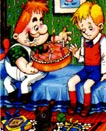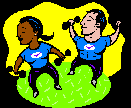Конспект урока «Learning More About Each Other» по английскому языку для 5 класса
МБОУ «Краснослободская СОШ№1»
Краснослободского района
Республики Мордовия
Цикл уроков английского языка
для 5 класса по теме:
«Learning More About Each Other»
(«Узнайте друг о друге»)
Урок подготовила учитель английского языка
Алешина Наталья Петровна
Unit 3. Learning More About Each Other.
Lesson 1.
Тема: May I Ask You a Question?
Цели урока:
Практические: учащиеся должны научиться
-использовать ранее пройденный лексико-грамматический материал в высказываниях по теме “How we can learn more about each other”;
- извлекать основную информацию из текста для чтения, обсуждать прослушанное;
- использовать изученную лексику и грамматику в кратких высказываниях;
Общеобразовательные:
- развитие общего кругозора (информация об образовательной программе по обмену учащимися);
- развитие филологического кругозора (повторение, закрепление раннее изученной грамматики);
- расширение словарного запаса
Развивающие:
- Развитие мыслительных процессов (сравнение, анализ);
- Развитие у учащихся аккуратности и настойчивости в преодолении трудностей в процессе работы над языком
Воспитательные:
- воспитание умения внимательно слушать собеседника;
- трудовое воспитание (учим учиться);
- формирование познавательной активности и поддержание интереса к учению.
Языковой и речевой материал:
1. Языковой материал.
Новый - to give an interview, to change, an exchange, a change.
Для повторения – разделительные вопросы
2 Речевой материал.
Новый – текст для аудирования, текст на чтение
Для повторения – употребление разделительных вопросов
Оснащение урока:
Аудиозапись;
Учебник Enjoy English - 3, М.З. Биболетова, Н.В. Добрынина, Н.Н. Трубанева,;
Ход урока
| 1 мин. T---CL 1 мин. 1 мин | |
1. Введение нового речевого материала -And now – meet Linda! (T points at her photo – p.40). Where does she study? What is she going to do next year? What is she doing now? Look through the text and find out about Linda. (Учащиеся просматривают текст, находят нужную информацию и отвечают на вопросы.) 2. Введение нового языкового материала. - I’ve got some new information about Linda. She is going to take part in a student’s exchange. Do you know what it is? Let’s do ex.5 p.42 and find out what the words “change” and “exchange” mean. (Ss do ex.5 p.42) (Дети анализируют значения слова “change”, при необходимости пользуются словарём). Pay attention that the word “change” has some different meanings. Compare the sentences:
Now pay attention to the words which sound similar in Russian and in English. Then Ss do ex.2 p.40:
- Now let’s read Linda’s interview (ex.3p.41) and learn more about her. (Pre-reading activities) 1.What questions would you ask Linda? 2.Find the words from ex.2 in the interview and underline them with your pencils in the text-books. 3.What questions does Linda answer in this interview? Find Wh-questions and mark them with a tick. Find Yes/No –questions and mark them. - Please, listen to Linda’s interview (ex.3p.41). Put on your head-phones and begin working. (Дети прослушивают аудиозапись и выполняют задания, находя нужную информацию. Первичное ознакомление с текстом.) Now let’s check up how you have done your task. III. Повторение раннее пройденного материала и развитие всех ВРД 1. Развитие навыков говорения (Tag-questions)
(If it’s necessary, T makes “a grammar pause” to refresh Ss’ grammar). -Linda speaks French, doesn’t she? -Her hobbies are theatre and music, aren’t they? -She plays the guitar, doesn’t she? -She is going to come with a group of students to Russia, isn’t she? - I want to know more about you but something is wrong with my computer Will you help me? (Ss do ex.4 p.20 WB: they “help the computer” to complete the tag-questions and write down short answers) 1. You study a lot of subjects, …? 2. You can play a musical instrument,…? 3. You don’t speak English,…? 4. You have English three times a week,…? … IV.Заключительный этап. А) подведение итогов -I see we can read the new words well. And what is the result of our lesson? (Ss’ possible answers: We can read the new words, we met Linda. we asked and answered a lot of questions, we know the word “change”. В) Сообщение дом.задания That’s great! Your hometask will be to learn the expressions with the words “change” and “exchange”- and ex.3 p.41, read ex.3 p.41. And do ex.1,2 p.55 in a written form. (T gives a short gist of the homework). С) сообщение оценок (с мотивировкой) Thank you for your active work. Your marks are... That’s all for today, the lesson is over. Good-bye! | 2 мин T---CL 8 мин. 7 мин P---P 7 мин. 3 мин. 5 мин. 5 мин. Упр. на закрепление лексических навыков, навыков орфографии 5 мин |
Lesson 2.
Тема: Personal Information
Цели урока:
Практические: учащиеся должны научиться
- использовать ранее пройденный лексико-грамматический материал в монологических высказываниях по теме (с опорой на ключевые слова)
- использовать новые ЛЕ в высказываниях по теме “Personal Information”
- использовать новую лексику в диалогах по теме“Personal Information”
- выразительно читать по ролям и разыгрывать диалоги по теме
Общеобразовательные:
- развитие филологического кругозора (повторение, закрепление раннее изученной грамматики);
- расширение словарного запаса
Развивающие:
- развитие памяти (слуховой, зрительной)
- Развитие внимания
Воспитательные:
- воспитание умения внимательно слушать собеседника;
- трудовое воспитание (учим учиться);
- воспитание эстетического вкуса (аккуратно сделанные наглядные пособия)
Языковой и речевой материал:
1. Языковой материал.
Новый - Typical, close, independent, serious, understanding, a nurse, characteristic, a parent, cruel, friendly, rude, (non-) athletic, to get on well with each other.
Для повторения - to give an interview, to change, an exchange, a change.
2 Речевой материал.
Новый – ситуации с опорой на речевые образцы.
Для повторения – диалог (учебник, упр.3 on с.41.)
Оснащение урока:
1.Аудиозапись;
2.Учебник Enjoy English - 3, М.З. Биболетова, Н.В. Добрынина, Н.Н. Трубанева,;
Интерактивная доска.
Карточки (прилагательные)
Презентация
Ход урока
| 2 мин. 1 мин. | |
| 3. Проверка домашнего задания - Now let’s check up your hometask. Your hometask was to learn the expressions with the words “change” and “exchange”. Open your books on page 41 and translate the sentences from Russian into English. 1.Мне нужно поменять платье перед обедом. 2. Могу я поменять русские деньги на английские фунты? 3. Погода меняется? 4. Давай пойдём в театр для разнообразия… - Well done. Now let’s see how you have done ex.3 on p.41. Shall we start reading? (Ss do it) Учитель проверяет чтение диалога по ролям)
1.Ознакомление учащихся с новым языковым материалом Thank you for your reading. It was very good. What do we use when we want to describe a person? Of course, adjectives. So, let’s introduce with new adjectives. Open your books on page 43 and listen to the disk. (Учащиеся прослушивают аудиозапись.) Ex.7 p.43. What do they mean? Repeat the words after me looking at the cards. Хоровая отработка лексики. (Учитель показывает карточки, на которых написаны слова с одной стороны на английском, с другой на русском языках.) Have you learnt the words? Please, arrange the words in pairs of opposites and write them in your exercise books. ( Дети записывают слова противоположные по значению.)Now we’ll work in pairs with cards. One pupil should name an adjective, another gives an opposite. Well done. III. Повторение раннее пройденного материала и развитие всех ВРД. 1. Развитие умений монологической речи I see you learn much about Linda. And what can you tell about yourselves? Let’s prepare for giving an interview. The claster on the blackboard will help you:
Who wants to tell about him/herself? (Ss tell about themselves. Ss’ possible answer: I speak Russian and English. I can play the piano. /I don’t play any musical instrument. I have got two close friends. My hobby is football). (Предполагается выслушать 4-5 учеников. Параллельно учитель исправляет типичные ошибки и оценивает рассказы) 2.Развитие умений диалогической речи -Let’s learn more about each other. It’s time to practise taking and giving an interview. Ex.3. will be a model for you. Work in pairs and act out the dialogue: one of you will be a correspondent who takes an interview, the other will give an interview (will play the part of Linda). (Ss act out the interview) | 2 мин T---Cl 5мин 7 мин. 7 мин. T---Cl 7мин P---P P---P 5 мин |
| 3.Активизация и первичное закрепление введённого материала - What can you say about these persons? T shows a poster with some portraits or uses the pictures – ex.8 p.45 (or Ss watch photos in the presentation). Ss’ possible answers: I think Shrek is independent, rude, ugly, impolite, unfriendly... I think Fiona is nice, brave, athletic....Etc. I think Donkey is talkative, has a good sense of humor.... | 4 мин. |
| And what about you? What are your main characteristics? (Ss possible answers: I think I am independent, athletic, etc.) -Thank you | |
| IV.Заключительный этап. А) подведение итогов -I see you can read the new words well. And what is the result of our lesson? (Ss’ possible answers: We can read the new words, we met Linda. we asked and answered a lot of questions, we know the word “change”, and we know more about each other. T may fix Ss’ answers on the blackboard). - I think it’s time to make some changes in our claster. Let’s change “I” for “We” and “My” for “Our”. Will you complete the claster? (T asks 3-4 students in turn, they change the words on the blackboard and complete the claster).
(Ss read the claster in choir) В) cообщение дом.задания Your hometask will be to review the new words, do ex.4 p.56 and tell about yourselves. (T gives a short gist of the homework). С) сообщение оценок (с мотивировкой) Thank you for your active work. Your marks are... That’s all for today, the lesson is over. Good-bye! | 5 мин. T---Cl |
Lesson 3
Тема: How to take an interview
Цели урока:
Практические: учащиеся должны научиться
- отвечать на вопросы учителя о чертах характера
- составлять краткие монологические высказывания по теме
- разыгрывать краткие диалоги по теме
- использовать ранее пройденный лексико-грамматический материал в монологических высказываниях по теме (с опорой на ключевые выражения)
Общеобразовательные:
- развитие филологического кругозора (повторение, закрепление раннее изученной грамматики и лексики);
- расширение словарного запаса
Развивающие:
- развитие памяти (слуховой, зрительной)
- развитие внимания
- развитие мыслительных процессов (сравнение, анализ)
- развитие реакции
Воспитательные:
- воспитание умения внимательно слушать собеседника;
- трудовое воспитание (учим учиться);
- воспитание эстетического вкуса (аккуратно сделанные наглядные пособия)
- воспитание культуры общения на иностранном языке
Языковой и речевой материал:
1. Языковой материал.
Новый - talkative, rude, cruel, friendly, traditional, caring, typical, close, independent, serious, understanding, a nurse, characteristic, a parent, cruel, rude, (non-) athletic.
Для повторения – Typical, close, independent, serious, understanding, a nurse, characteristic, a parent, cruel, friendly, rude, (non-) athletic, to get on well with each other.
2 Речевой материал.
Новый – ситуации с опорой на речевые образцы.
Для повторения – диалог (учебник, упр.3 on с.41.) Grammar:
I’d like.., should,
Оснащение урока:
Аудиозапись;
Учебник Enjoy English - 3, М.З. Биболетова, Н.В. Добрынина, Н.Н. Трубанева,;
Интерактивная доска.
Карточки с прилагательными
Ход урока
| 2 мин T---Cl group work 5 мин 1 мин 2 мин T---P 1мин 2 мин T---Cl 7 мин T---Cl 5мин P---P 8 мин P---P | ||||||||
| 1 Развитие умений монологической речи Now I want to ask you a question. Say what kinds of people you like and don’t like. Explain why. Use the words- ex.11. -Find out the likes and dislikes of your classmates. Make up a chart. (Ss do ex.12,13 p.45)
- Look at the photos –p.45, please.(T may use other visuals as well). Describe the kind of person you would like to make friends with. Why? ( | 5 Мин | |||||||
| - Now I’ll give some pieces of paper. Write down your friends’ characteristics, please. Use 3-5 words. Don’t show your papers to your classmates. I’ll give you two minutes. Ready? I’m going to collect your cards and read them aloud. Guess whose characteristics these are. IV.Заключительный этап. А) подведение итогов Today we have learnt the words which name traits of character. What are your personal results? (Ss possible answers: I know the words...., I can give one’s personal characteristic, I can describe myself etc). В) Сообщение дом.задания Your hometask is to prepare a topic ‘’My friend’’. С) сообщение оценок (с мотивировкой) Thank you for your active work. Your marks are... That’s all for today, the lesson is over. Good-bye | 4 мин упр. на закрепление лексических навыков, навыков орфографии 3 мин | |||||||
Lesson 4
Тема: Family
Цели урока:
Практические: учащиеся должны научиться
- составлять краткие монологические высказывания по теме
- разыгрывать краткие диалоги по теме
- использовать ранее пройденный лексико-грамматический материал в монологических высказываниях по теме (с опорой на ключевые выражения)
-выразительно читать по ролям и разыгрывать краткие диалоги по теме
Общеобразовательные:
- развитие филологического кругозора (повторение, закрепление раннее изученной грамматики и лексики);
- расширение словарного запаса
Развивающие:
- развитие памяти (слуховой, зрительной)
- развитие внимания
- развитие мыслительных процессов (уметь проанализировать стихотворение)
- развитие реакции
-развитие умений выражать своё мнение.
Воспитательные:
- воспитание умения внимательно слушать собеседника;
- трудовое воспитание (учим учиться);
- воспитание культуры общения на иностранном языке
- воспитывать критически, оценивать на свои черты характера
Языковой и речевой материал:
1. Языковой материал.
Новый - family descriptions
Для повторения – traits of character
2 Речевой материал.
Новый – новый диалог, стихотворение, ситуации с опорой на речевые образцы.
Для повторения – рассказ о друге (домашнее задание)
Оснащение урока:
1.Аудиозапись;
2.Учебник Enjoy English - 3, М.З. Биболетова, Н.В. Добрынина, Н.Н. Трубанева,;
3.Интерактивная доска.
4.Карточки с прилагательными
Ход урока
| 1 мин 2 Мин T---Cl 1 мин 3мин | ||||||||||||||||||||||||||||||||||
| II.Ознакомление и тренировка нового языкового материала 1. Развитие умений говорения -You see, all the people are different: different hobbies, trait of characters, different appearance. And our families are different.
-Are they a close family? Do they get on well? (T translates the meaning of the expressions: a close family, to get on well with each other). How would you describe Linda’s family, I mean what are their main characteristics? (Ss’ answers: I think her mother is kind.., etc.) -Let’s make a chart. T makes a chart on the blackboard. Ss put down the information in their copy-books.
3. Развитие навыков чтения -Now let’s listen to Linda’s interview, read her answers and find out more information about Linda’s family. While reading mark all personal characteristics with a tick. Ss do ex.6 p.43 -Let’s complete our chart –ex.7 p.43 will help us. Work in pairs, please. Complete the chart “Linda’s family”. Linda’s Family
- Read the dialogue once more and aсt the dialogue. 4. Развитие умений монологической речи.
5.Развитие умений диалогической речи. - Now we’ll try to take an interview. (Учитель вызывает сильного ученика, дети задают ему вопросы) Ask questions.
| 7 Мин 5 мин P---P 3 мин P---P 3 Мин 2 мин Cl---P | |||||||||||||||||||||||||||||||||
| III. Повторение раннее пройденного материала и развитие всех ВРД. 1.Проверка домашнего задания - Let’s check up your homework. Talk about your best friend. How would you describe him\her. Use a plan:
-You see, now you can describe yourselves and your friends. I think we have learned more about each other. 2. Развитие навыков письма - Now I’ll give some pieces of paper. Write down your friends’ characteristics, please. Use 3-5 words. Don’t show your papers to your classmates. I’ll give you two minutes. Ready? I’m going to collect your cards and read them aloud. Guess whose characteristics these are. | 7мин 6 мин | |||||||||||||||||||||||||||||||||
| IV.Заключительный этап. А) подведение итогов Today we have learnt and review the words which name traits of character, hobbies, family descriptions. В) Сообщение дом.задания Your hometask will be to prepare the topic “My Family” and to read ex.15 p.46 С) сообщение оценок (с мотивировкой) Thank you for your active work. Your marks are... That’s all for today, the lesson is over. Good-bye! | 5мин |
Lesson 5
Тема: An Ideal Family
Цели урока:
Практические: учащиеся должны научиться
- выразительно читать стихотворение
- использовать новые ЛЕ в высказывании по теме “An Ideal family”
- читать текст по теме с извлечением конкретной информации по заданию учителя
- составлять краткие монологические высказывания по теме с использованием зрительных опор
- использовать ранее пройденный лексико-грамматический материал в монологических высказываниях по теме (с опорой на ключевые выражения)
Общеобразовательные:
- развитие филологического кругозора (повторение, закрепление раннее изученной грамматики и лексики);
- расширение словарного запаса
Развивающие:
- развитие памяти (слуховой, зрительной)
- развитие внимания
-развитие умений выражать своё мнение.
Воспитательные:
- воспитание умения внимательно слушать собеседника;
- трудовое воспитание (учим учиться);
- воспитание эстетического вкуса (аккуратно сделанные наглядные пособия)
Языковой и речевой материал:
1. Языковой материал.
Новый - the words with negative meaning
Для повторения – traits of character, family descriptions
2 Речевой материал.
Новый – новый текст, стихотворение.
Для повторения – рассказ о семье (домашнее задание)
Оснащение урока:
Аудиозапись;
Учебник Enjoy English - 3, М.З. Биболетова, Н.В. Добрынина, Н.Н. Трубанева,;
Карточки с приставками.
Интерактивная доска.
Ход урока
| 1 мин 5 мин Отработка ритмико-интонацион ных навыков 1 мин | |
| II. Ознакомление и тренировка нового языкового материала. 1. Введение нового языкового материала. -I see, you know a lot of words to describe your families. And I have got a special task for you. Look! There are 4 cards: in- im- non un- I am going to attach them to the words. (T sticks the cards to the written on the blackboard adjectives). Non-athletic unfriendly impolite infamous -Do you see any changes? What is the difference between athletic and non-athletic? Guess the meaning of non-, im-, in-, un- . (Ss translate the words which have the opposite meaning). -Find out the meaning of these words. (T asks Ss to do ex.9,10 p.44) and use the dictionary if necessary. You can use these words to describe someone’s character Look at the blackboard, please. There is a special task for you. You can see two bags: a good bag and a bad bag. Let’s put our good characteristics into the good bag and bad – into the bad one. (Ss come to the blackboard and write down the adjectives on the “bags”) OK. Let’s tight the bad bag and put it away, name our good characteristics all together. (Ss name their good characteristics like a chant: We are kind. We are intelligent, etc). III. Повторение раннее пройденного материала и развитие всех ВРД. 1.Проверка домашнего задания Now tell us about your families. Use a plan:
Thank you very much. 2.Развитие навыков говорения And now think about the questions: What is an ideal family? Is your family ideal? Describe any member or two of your family. Use: I think... Usually he\she is... Sometimes he\she is... (Ss possible answers: I think my mum is sociable and friendly. She likes to invite friends). -And now – describe an ideal family, please. There is a model. (Ss do ex. 16 p.46). -Let’s sum up our ideas what an ideal family is. A
(T makes a flower-shape claster on the blackboard).
My ideal family is... Close Hospitable 3. Развитие навыков чтения There are rules for children and there are rules for parents in every family. Let’s have a fun. Read the rules for children and the rules for parents. Add your own rules. Use your sense of humor. Then we’ll see and find out the strictest rule, the funniest rule, the best rules, etc. You may work in groups. (Ss do ex.17 p.46) IV.Заключительный этап. А) подведение итогов Today we have learnt the words with negative meaning. What are your personal results? (Ss possible answers: I know the words: impossible, unknown..., etc). Can you tell about your family, an ideal family? В) Сообщение дом.задания Your hometask will be to prepare the topic “An Ideal Family” and to learn the new words with negative meaning. С) сообщение оценок (с мотивировкой) Thank you for your active work. Your marks are... That’s all for today, the lesson is over. Good-bye! | 3 Мин 5 мин 5 мин 1 мин 7 Мин 7 Мин 5 мин Group work 5 мин |
Lesson 6
Тема: Му Pets
Цели урока:
Практические: учащиеся должны научиться
- составлять краткие диалоги по теме с использованием зрительных опор
- использовать ранее пройденный лексико-грамматический материал в монологических высказываниях по теме (с опорой на ключевые выражения и без неё)
Общеобразовательные:
- развитие филологического кругозора (повторение, закрепление раннее изученной грамматики и лексики);
- расширение словарного запаса
Развивающие:
- развитие памяти (слуховой, зрительной)
- развитие внимания
-развитие умений выражать своё мнение.
Воспитательные:
- воспитание умения внимательно слушать собеседника;
- трудовое воспитание (учим учиться);
- воспитание эстетического вкуса (аккуратно сделанные наглядные пособия)
Языковой и речевой материал:
1. Языковой материал.
Новый -
Для повторения – the words with negative meaning
2 Речевой материал.
Новый – новый диалог
Для повторения – рассказ “An Ideal Family” (домашнее задание)
Оснащение урока:
Учебник Enjoy English - 3, М.З. Биболетова, Н.В. Добрынина, Н.Н. Трубанева,;
Карточки с приставками.
Интерактивная доска.
Ход урока
| 1 мин 1 мин T---P Group work 7 Мин 5 Мин. 5 мин Упр. на закрепление лексических навыков, навыков орфографии Cl---P 5 мин 1 мин T---Cl 3 мин 3 мин Условно-речевое упражнение 1 мин 5 мин group work 5 мин Group work Упр. на закрепление лексических навыков, навыков орфографии 3 Мин |
Lesson 7
Тема: Professions
Цели урока:
Практические: учащиеся должны научиться
- извлекать основную информацию из текста на аудирование“Professions”
- составлять краткие монологические высказывания ( по аналогии с прослушанным)
- использовать новые ЛЕ и грамматическую структуру –to be going to- в высказывании по теме “Professions”
-выразительно читать стихотворение “What are you going to be?” и на его основе попытаться сочинить своё
- составлять краткие монологические высказывания по теме с использованием зрительных опор и ключевых слов
- использовать новую лексику в диалогах по теме“Professions”
Общеобразовательные:
- развитие филологического кругозора (повторение, закрепление раннее изученной грамматики и лексики);
- расширение словарного запаса
Развивающие:
- развитие памяти (слуховой, зрительной)
- развитие внимания
- развитие мыслительных процессов (сравнение, анализ, логика)
Воспитательные:
- воспитание умения внимательно слушать собеседника;
- трудовое воспитание (учим учиться);
- воспитание эстетического вкуса (аккуратно сделанные наглядные пособия)
Языковой и речевой материал:
1. Языковой материал.
Новый - professions
Структура: to be going to do smth
Для повторения – traits of character
2 Речевой материал.
Новый – тексты по теме
Для повторения – диалоги по теме
Оснащение урока:
1.Учебник Enjoy English - 3, М.З. Биболетова, Н.В. Добрынина, Н.Н. Трубанева,;
2.Картинки (профессии);
3Аудиозапись;
4.Карточки с названиями профессий
5.Карточки с описаниями профессий
Ход урока
| 1мин. 3 мин. T---Cl 5 мин. T---Cl 3 мин 4 мин Упр. на закрепление лексических навыков, навыков орфографии 5мин 3мин T---Cl 4 мин Cl---P 2 мин 3 мин Group work T---Cl 3 мин 3 мин 3 мин Cl---P 3 мин |
Lesson 8
Тема: Dangerous jobs
Цели урока:
Практические: учащиеся должны научиться
- извлекать основную информацию из текста на аудирование“ Dangerous jobs ”
- составлять краткие монологические высказывания ( по аналогии с прослушанным)
- использовать новые ЛЕ в высказывании по теме “ Dangerous jobs ”
- составлять краткие монологические высказывания по теме с использованием зрительных опор
- использовать новую лексику в диалогах по теме“ Dangerous jobs ”
- читать текст по теме с извлечением конкретной информации по заданию учителя
Общеобразовательные:
- развитие филологического кругозора (повторение, закрепление раннее изученной грамматики и лексики);
- расширение словарного запаса
Развивающие:
- развитие памяти (слуховой, зрительной)
- развитие внимания
- развитие мыслительных процессов (сравнение, анализ, логика)
Воспитательные:
- воспитание умения внимательно слушать собеседника;
- трудовое воспитание (учим учиться);
- воспитание эстетического вкуса (аккуратно сделанные наглядные пособия)
Языковой и речевой материал:
1. Языковой материал.
Новый – dangerous, vet, bodyguard, job
Для повторения – traits of character, occupations\jobs
2 Речевой материал.
Новый – тексты по теме
Для повторения – бланки“Personal information”
Оснащение урока:
1.Учебник Enjoy English - 3, М.З. Биболетова, Н.В. Добрынина, Н.Н. Трубанева,;
2.Аудиозапись;
3.Картинки (профессии)
4.Таблица“ Dangerous jobs ”
5. Бланки “Personal information”
Ход урока
| Why is it a dangerous job? | What do they do? | Who can become a bodyguard/a vet? | Would you like to be a bodyguard/a vet? | |
| | | | | |
2.Развитие навыков говорения на основе прочитанного.
-Share information with your classmates who have read the other text. Use your charts.
Ss who have read the text about vets ask the Ss who have read the text about bodyguards. They use their chart as a plan. (Ученики, причитавшие о профессии телохранителя, получают информацию о профессии ветеринара, задавая вопросы. И наоборот.)
-Who can tell us about the profession of a vet\ a bodyguard?
(Representatives from 2-3 groups are suggested to tell about these professions. They may use the chart as a plan).
-Would you like to be a vet\ a bodyguard? Why?
3. Развитие навыков письма.
- It is interesting to know what profession suits (учитель переводит слово “suit”) you. To understand it you should fill in blanks with your personal information, please.
Name
Home address
Date of birth
School year
Father’s occupation
Mother’s occupation
Brothers
Sisters
What foreign languages do you speak?
In your opinion, what are your main characteristics?
What are your hobbies?
Do you play any musical instruments?
What do you like to do?
4.Развитие навыков говорения на основе написанного.
-Share information with your classmates. (Дети делятся информацией и делают свои предположения, кем они могут стать в будущем).
IV.Заключительный этап.
А) подведение итогов
Today we have reviewed the words, learned to write about ourselves. What are your personal results? (Ss give their answers). What new information have you got? What do you know about dangerous jobs?
В) Сообщение дом.задания
Your hometask will be ex.27 p.49. (To read and translate the texts and answer the questions)
С) сообщение оценок (с мотивировкой)
Thank you for your active work. Your marks are...
That’s all for today, the lesson is over. Good-bye!
1 мин
3 мин
Отработка ритмико-интонацион
ных навыков
5 мин
1 мин
T---Cl
4 мин
Group work
9 мин
Group work
5 мин
3 мин
Условно речевое упражнение
5 мин
Group work
5 мин
4 мин
Lesson 9
Тема: A Person I Love and Respect
(урок повторения)
Цели урока:
Практические: учащиеся должны научиться
- выразительно читать и находить ошибки в чтении у своих одноклассников
- составлять краткие монологические высказывания по теме “A Person I Love and Respect” с использованием зрительных опор
- использовать ранее пройденный лексико-грамматический материал в диалогической речи
Общеобразовательные:
- развитие филологического кругозора (повторение, закрепление раннее изученной грамматики и лексики);
- расширение словарного запаса
Развивающие:
- развитие памяти (слуховой, зрительной)
- развитие внимания
- развитие мыслительных процессов (сравнение, анализ, логика)
Воспитательные:
- воспитание умения внимательно слушать собеседника;
- трудовое воспитание (учим учиться);
- воспитание эстетического вкуса (аккуратно сделанные наглядные пособия)
Языковой и речевой материал:
1. Языковой материал.
Новый –
Для повторения – traits of character, hobbies, occupations\jobs, family descriptions
2 Речевой материал.
Новый –
Для повторения – тексты “Bodyguards”, “Vets”
Оснащение урока:
1.Учебник Enjoy English - 3, М.З. Биболетова, Н.В. Добрынина, Н.Н. Трубанева,;
2.Аудиозапись (стихотворение)
3. Карточки
Ход урока
| The hero of the story (a parent, a friend, a sister, a brother, one of the famous people) | Traits of character | The date of birth | Why Ss respect him\her | |
| | | | | |
-Now let’s sum up our results:
Whom do you respect and love?
What traits of character do you respect in people most of all?
What month\season were most of these people born in?
Why do you respect these people?
Whose story do you like best of all?
2.Развитие навыков говорения
-I suggest you to play a game “Friendly Biscuits Company”. It’s a kind of bingo. You’ll play in 4 groups, each group will get a card. You shouldn’t show it to the other groups. Now look and find out what information there is in the cards. So, you’ve got: the names of the people who work in the company, their occupations, their traits of character and their hobbies. But some information in your cards is misssing. Your task is to ask questions like:
-Who is the Boss?
-What’s the agent’s name?
-What is Mr.Zimin?
-What kind of person is the Boss? Etc.
(There are some model questions on the blackboard).
-Then you fill in your cards and we compare your variants to the correct one.
The key card:
| Name | Characteristics | Hobby | |
| Boss | Mr.Zimin | Intellegent | Swimming |
| Top manager | Mr.Brown | Sociable | Diving |
| Agent | Mr.Bond | Independent | Football |
| Secretary | Mary | Talkative | Dancing |
| Driver | Tom | Responsible | Watching TV |
| Bodyguard | Mr.Schwarznegger | brave | karate |
III.Заключительный этап.
А) подведение итогов
Today we have reviewed the words. What are your personal results? (Ss give their answers). What new information have you got? Is it difficult to work in a group? Is it interesting to work in a group?
В) Сообщение дом.задания
Your hometask is to write down the words and expressions –p.58 in your vocabularies. Creative task – to write a poem about your parents:
A poem map An example:
-
a noun My father
-
two adjectives describing the responsible, brave
noun on line 1
-
three words ending with –ing working, caring, watching a football match
(action words) that describe the
noun on line 1 might do.
-
a phrase describing the noun on line 1 a special person in my life
-
a synonym of the word on line 1. Friend.
-You may decorate your poem: cut out a red construction paper heart. Write a poem on a white-lined paper and cut it out in the shape of heart, a little smaller than the red heart. Glue the paper with the poem on it onto the red paper heart. To give the card some interest, glue on a white paper a ribbon onto the back of the red heart. (Ученики записывают алгоритм построения стихотворения)
С) сообщение оценок (с мотивировкой)
Thank you for your active work. Your marks are...
That’s all for today, the lesson is over. Good-bye!
5 мин
Отработка ритмико-интонацион
ных навыков
6 мин
P---P
8 мин
Group work
1 мин
7 мин
T---P
Group work
7 мин
6
мин
Lesson 10
Тема"Learning More about Each Other"
(обобщающий урок)
Практические: учащиеся должны научиться
- использовать изученную лексику в кратких высказываниях
- извлекать основную информацию из текста на аудирование
- использовать ранее пройденный лексико-грамматический материал в диалогической речи и разыгрывать краткие диалоги по теме
- использовать новую грамматическую структуру to be doing в речи
Общеобразовательные:
- развитие филологического кругозора (ознакомление с Present Continuous Tense);
- расширение словарного запаса
Развивающие:
- развитие памяти (слуховой, зрительной)
- развитие внимания
- развитие мыслительных процессов (сравнение, анализ)
Воспитательные:
- воспитание умения внимательно слушать собеседника;
- трудовое воспитание (учим учиться);
- воспитание эстетического вкуса (аккуратно сделанная презентация)
Языковой и речевой материал:
1. Языковой материал.
Новый –
Для повторения – traits of character, jobs, family descriptions, hobbies.
2 Речевой материал.
Новый – the Present Continuous tense; текст на аудирование
Для повторения – стихотворения
Оснащение урока:
1.Учебник Enjoy English - 3, М.З. Биболетова, Н.В. Добрынина, Н.Н. Трубанева,;
2.Аудиозапись;
3. Презентация (Приложение 1).
Ход урока
| CHARACTER | JOB | HOBBY | |
| FATHER |
|
|
|
| MOTHER |
|
|
|
| BROTHER |
|
|
|
| BRYAN |
|
|
|
Текст аудирования:
Hello, my name is Bryan!
I’d like to tell you about my family. My family isn’t large. There are four of us in the family: father, mother, my brother and I. Our family is very close and hospitable.
My father is a businessman. He works hard. He is clever and responsible. My Dad likes reading newspapers.
As for my mother, she is a housewife. She is kind and sociable. My Mum’s hobby is cooking.
I have got an elder brother, Nick. He studies at the University. He likes to write his own computer programmers. Nick is going to be a computer programmer. My brother is bright and I get on well with him.
I’m a pupil of the 7th form. I have to confess I’m naughty and curious. I like studying English and History. I’m going to be a diplomat or a lawyer.
III. Ознакомление и тренировка нового языкового материала.
1. Введение нового речевого материала.
-We’ll learn to describe the actions at the moment. The verb to be and the –ing form of the action verbs will be our helpers. By the way, do you remember the forms of the verb to be? (слайд 8, 9).
2. Активизация и первичное закрепление введённого материала.
Let’s do ex.35p.53. Look at the pictures. Say what they are doing. (Вместо картинок дети подставляют сказуемое)
- Pay attention to the rules of writing of the ing-forms:
Write+ing=writing
Put+ing=putting.
Then Ss do ex.34 p.53. (Ученики практикуются в написании: Talk – talking, smile – smiling…)
-Do you remember how to answer yes\no questions with the verb to be? I think you do. Let’s play a guess game. Please, help me to guess what Alice is doing at the moment.
(T shows Ss a picture but doesn’t look at it).
T: -Is Alice doing her homework? Ss:-No, she isn’t
T:-Is Alice walking her dog? Ss:-Yes, she is.
-Thank you for your active work. Remember this game while doing your hometask.
IV.Заключительный этап.
А) подведение итогов
Today we have reviewed the words. What are your personal results? (Ss give their answers). What new information have you got? Is it interesting to learn English?
В) Сообщение дом.задания
Your hometask is to learn the rule ex. 31 p.51, to write ex.34 p.53
С) сообщение оценок (с мотивировкой)
Thank you for your active work. Your marks are... I hope you liked our lessons. See you soon.
1 мин
Отработка ритмико-интонацион
ных навыков
4 мин
1 мин
3 мин
T---Cl
2 мин
T---Cl
T---Cl
2 мин
T---Cl
7 мин
P---P
7 мин
2 мин
T---Cl
3 мин
5 мин
Упр. на закрепление лексических навыков, навыков орфографии
3 мин
T---P
5 мин
Литература к серии уроков:
1. М.З.Биболетова. "Английский с удовольствием" 5-6 кл.
2. М.З.Биболетова. Рабочая тетрадь к учебнику "Английский с удовольствием" 5-6кл.
3. М.З.Биболетова. Программа по английскому языку для 2-9 кл.
Здесь представлен конспект к уроку на тему «Learning More About Each Other», который Вы можете бесплатно скачать на нашем сайте. Предмет конспекта: Английский язык (5 класс). Также здесь Вы можете найти дополнительные учебные материалы и презентации по данной теме, используя которые, Вы сможете еще больше заинтересовать аудиторию и преподнести еще больше полезной информации.










 I think Lord Farquard is ugly, unfriendly, cunning...
I think Lord Farquard is ugly, unfriendly, cunning... Ss possible answers: I’d like to make friends with Karlson. I think he is kind, friendly and creative... He has a sweet tooth.., etc).
Ss possible answers: I’d like to make friends with Karlson. I think he is kind, friendly and creative... He has a sweet tooth.., etc).


 FAMILY
FAMILY

 possible mind-map:
possible mind-map:












 Doing things together
Doing things together

















